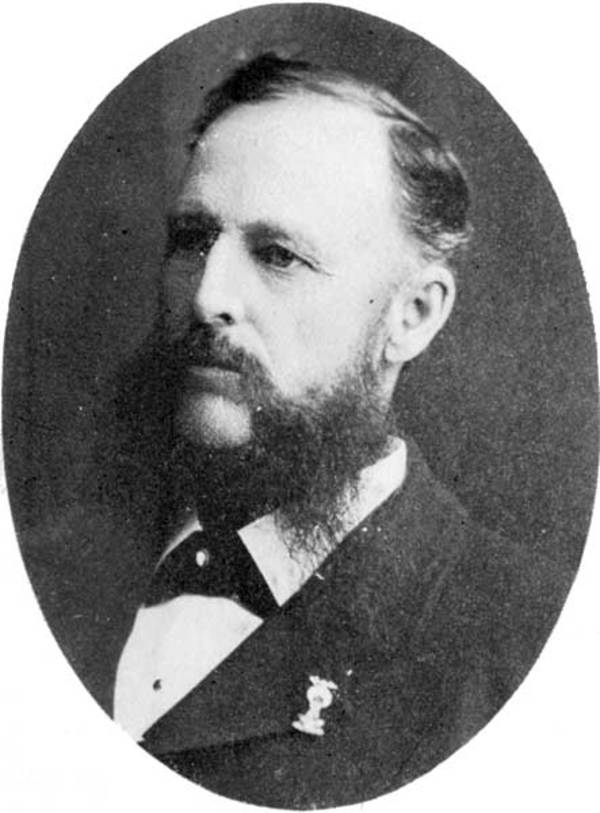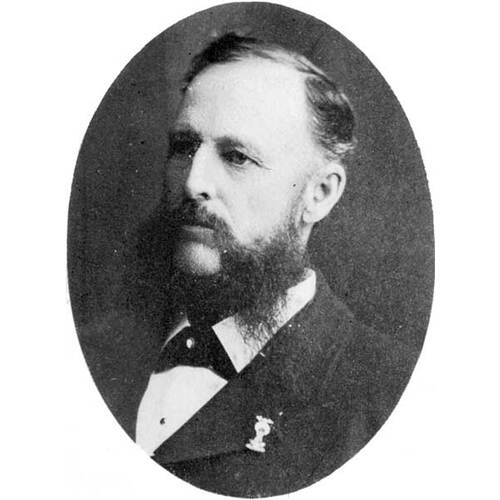
Source: Link
HARRIS, JOHN WALTER, surveyor, tax assessor, jp, and author; b. 26 Feb. 1845 near Kemptville, Upper Canada, son of John Harris and Jane Jones; m. first 12 April 1876 Susan Elizabeth Smith (d. 1918) in Waltham, Iowa; they had no children who survived birth; m. secondly 15 June 1921 Annie Jane Millions, née Watson, in Winnipeg, Man.; they had no children; d. there 20 March 1926.
J. W. Harris’s parents, John Harris and Jane Jones, were of Irish and Welsh descent respectively and were early settlers in Oxford Township, Upper Canada. After studies in civil engineering and surveying in Toronto, Harris secured his land surveyor’s commission in 1866. He subsequently taught elementary school in Illinois and Iowa from 1868 to 1871. While in Iowa he obtained a first-grade teaching certificate and introduced a method of arithmetic he had devised known as the Lightning Calculator. During 1871–72 he was an investor in and operator of a lumber mill at Batchawana Bay, Ont., on the north shore of Lake Superior.
In mid July 1873 Harris accepted a post as a dominion surveyor in Manitoba. In this capacity he laid out Indian reserves north of Winnipeg, surveyed wood lots, unclaimed lands, and settlement areas along the Red and Assiniboine rivers, and planned the towns of Emerson and Selkirk. By the late 1870s, his practice had shifted from work for the federal government to work in the private sector and for the province.
Harris’s association with the city of Winnipeg began on 10 Feb. 1879 when he was hired to prepare the annual tax assessment and collection rolls. He kept the job in 1880, lost it the next year after seeking a salary increase, but was rehired in early 1882 when two additional assessors were also appointed. From 18 Dec. 1882 to his retirement on 30 April 1916 he held the posts of assessment commissioner and city surveyor.
During Harris’s tenure, the value of land, buildings, and other property multiplied many times over as Winnipeg grew in size and wealth. The responsibilities and resources of his office likewise expanded. Between 1893 and 1910 he implemented major changes in methods of assessing businesses. He also organized special block surveys in the early 1890s to ensure that the city’s future development would be orderly and free of the errors that had caused so many property disputes in the past. He took every opportunity to consult with officials in eastern Canada and the United States on assessment matters, attended international conferences on taxation, and presented papers. Over time, he became a source of advice for others in the fields of assessment and urban planning.
Harris retained a private surveying practice into the early 1900s and actively furthered the profession’s development. He was among the 11 surveyors who met in Winnipeg on 24 April 1874 to organize a provincial association, the first in Canada. The group was unable to gain legislative recognition in 1875, but a renewed effort in 1880–81 was successful. Harris was secretary of the Association of Provincial Land Surveyors from 1881 to early 1904 and its president in 1907 and 1916. He also was involved for more than 20 years on its board of examiners.
Ever entrepreneurial, Harris became a director of several local businesses and he frequently invested in mining ventures, land, rental properties, and agricultural enterprises, both in Canada and abroad. Some endeavours were profitable, others failed; none made him exceptionally wealthy, but he had a comfortable lifestyle. Among other activities, Harris became a justice of the peace in 1883. He supported the involvement of his first wife, Susan, in arts, social and animal welfare, hospital aid, and nursing organizations, but he was most prominent in sports and masonic circles. He planned many racecourses, laid out the Winnipeg Industrial Exhibition grounds, and often was a timer, judge, or referee at horse-racing, track, and other sporting events. Avidly interested in baseball, he helped run a local amateur league and a professional club, the Winnipeg Maroons. A long-time adherent of the Ancient Free and Accepted Masons, he served as a master and deputy master.
Harris’s retirement from the city did not inaugurate a period of leisure. Instead, he plunged into the preparation of a manuscript on abbreviated methods of arithmetic, which he published in 1919. As part of his pension agreement with the city, he served on the Board of Valuation and Revision into the 1920s. He continued to participate in municipal tax reform and urban planning. He also managed his many investments and organized a library at the masonic temple.
Harris was physically imposing in presence, firm in his principles, demanding of himself and others, and always open to new ideas and challenges. His career and his business and personal relations had their share of controversy. He nonetheless garnered public praise and honours for his contributions to his profession and his community, including his formative role in the development of Winnipeg’s civic administration.
John Walter Harris is the author of The art of rapid computation and simplification of the science of numbers . . . (Winnipeg, 1919).
AM, GR 393, I-2-6-17, file 17379; GR 549A, G4339, Y17: ff.526–27; MG 11, A20; MG 14, C74. City of Winnipeg, Arch. and records control branch, City Council, minutes, 1878–1911, 1914–16. Manitoba Free Press, 6, 14 May 1875; 28 Dec. 1878; 11, 13 Feb. 1879; 11, 25 Jan., 1–3, 15 Feb., 26 May, 23 June, 6 Sept., 6–7, 13 Dec. 1881; 24, 26, 31 Jan., 1, 14 Feb., 7 Nov., 19 Dec. 1882; 13 Dec. 1892; 15 Feb. 1902; 11, 13 Feb. 1908; 14, 16 Oct. 1915; 20, 25 Jan. 1916; 18 April, 5–14 Nov. 1917; 21, 23 Dec. 1918; 28 June 1919; 17 June 1921; 22, 24 March 1926. Edith Paterson, “The diary of J. W. Harris,” Winnipeg Free Press, 1, 8 March 1969, Leisure Magazine; “J. W. Harris – land surveyor,” Winnipeg Free Press, 22 Feb. 1969, Leisure Magazine. Winnipeg Tribune, 23 Aug. 1910; 13–14, 19 Oct. 1915; 20, 26 Dec. 1918; 21 June 1919; 16 June 1921; 22, 24 March 1926. George Bryce, A history of Manitoba; its resources and people (Toronto and Montreal, 1906). “J. W. Harris, m.l.s., d.l.s,” Canadian Surveyor (Ottawa), 2 (1925–28), no.4: 15.
Cite This Article
Deborah M. Lyon, “HARRIS, JOHN WALTER,” in Dictionary of Canadian Biography, vol. 15, University of Toronto/Université Laval, 2003–, accessed December 31, 2025, https://www.biographi.ca/en/bio/harris_john_walter_15E.html.
The citation above shows the format for footnotes and endnotes according to the Chicago manual of style (16th edition). Information to be used in other citation formats:
| Permalink: | https://www.biographi.ca/en/bio/harris_john_walter_15E.html |
| Author of Article: | Deborah M. Lyon |
| Title of Article: | HARRIS, JOHN WALTER |
| Publication Name: | Dictionary of Canadian Biography, vol. 15 |
| Publisher: | University of Toronto/Université Laval |
| Year of publication: | 2005 |
| Year of revision: | 2005 |
| Access Date: | December 31, 2025 |



